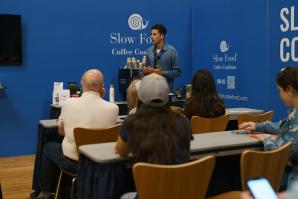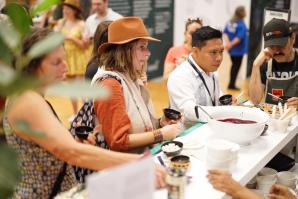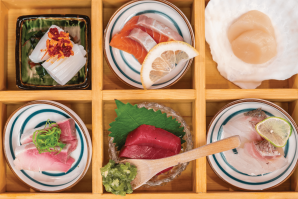“Radishes. Radishes? Is it the creamy eggplant Caesar dip? A sake-pickled radish?”
On Friday, October 11, Yotam Ottolenghi hosted a book talk and cooking demo at Sacramento’s Tsakopoulos Library Galleria in conversation with Benjy Egel, restaurant critic for the Sacramento Bee. Before the chef appeared, some in the audience hit the indexes of Ottolenghi’s newest cookbook, “Comfort,” to guess the fate of colorful ingredients mise en place (put in place) next to the fronds of dill and mint on stage.
More guests arrived with their seasoned copies of his earlier cookbooks, including “Simple,” “Plenty,” “Flavor” and “Jerusalem,” and stories of how they “got to know” the international chef and restaurant owner. Some were surprised that such a big name in the culinary world would visit “Sacramento, of all places” — despite the agricultural epicenter Comstock’s readers know Sac to be. Sacramento was one of nine venues the chef visited as part of his U.S. tour to promote his 10th cookbook. Each show on the tour featured a Q&A, a special guest and a cooking demonstration in which the audience members voted on which ingredients would go into crepes.
In answer to “why Sacramento,” the chef noted the sheer abundance of quality local ingredients available. “Every time I come to California I am so jealous, because I live in England. Don’t get me wrong, we have good ingredients and vegetables, but they are limited. Seasonality is something we celebrate so much. … It’s so frustrating when I come here and see all the wonderful produce. Like peaches! I haven’t seen a peach for like three months now. It’s difficult not to get inspired by the produce you have. And such good quality olive oil. Great wine.”
The event was also reflective of Sacramento’s growth as a food hub. Next September, Sacramento will host two events for food lovers: Terra Madre, the first full-scale American version of the Slow Food Movement’s flagship event that started in Turin, Italy, in 1996, and the annual Farm-to-Fork Festival.
Dill, mint and other ingredients were arranged on stage in
preparation for Yotam Ottolenghi’s cooking demo. (Photo by Anna
Dobrowolski)

“A number of factors have contributed to that growth, including a nationwide focus on local sourcing and Sacramento’s relative affordability attracting people from the Bay Area and Los Angeles, but perhaps the biggest one is that the dining public knows more about food and is more willing to be adventurous than in years past,” says Egel.
“Sacramento’s modern diners encourage chefs to be more creative and support the restaurants that are truly excellent, which has brought national attention to the region’s dining scene in the form of James Beard Awards, Michelin stars and glowing articles,” he continues. “Having internationally renowned chefs and cookbook authors such as Yotam Ottolenghi visit only spurs that movement.”
Balancing fusion
Ottolenghi is known for infusing ingredients from around the world into dishes with equally widespread origins — from mung bean to kimchi, meatloaf to falafel. On stage, Egel asked the chef how he stands out in a world of infinite fusions. In the process of defamiliarizing something that many may have an emotional connection to, how does one balance creativity without stepping into the land of cultural appropriation?
“Historically, all food is ‘hybrid food,’” Ottolenghi said. “Cooking has never been an activity that’s been practiced by one person on their own; it’s always been a process of cultural exchange between members of a family or clan. It’s never been ghettoized to a particular place, it’s always been fluid. The problem today is that we want to perceive ‘traditions’ and call things authentic, which is bogus because those were fluid from the beginning.
“And often our ideas of ‘authenticity’ are overrated and many times plain wrong. When you travel the world, you’ll often find that people will disagree with certain traditions within the same culture.Purity is something an outsider expects, rather than something that is practiced by chefs. That’s just one part. It’s important to tell the story of the dish and not erase its history. When a recipe comes from somewhere, I want to tell people where the inspiration came from. It’s a way to capture the origin of a dish.”
He takes a similar approach towards food tourism and foodie destinations. “Wherever I go I always try to learn something. I always come back with a recipe or idea that I utilize for cookbooks or myself. I think it’s a wonderful way to explore a new place or learn from a culture. I always research restaurants and markets. Food is a great way to break cultural barriers because it’s a great way into conversations with people. Food is a global language everyone understands. It can start with food but end up going in an entirely different direction.”
Chef Yotam Ottolenghi visited Sacramento as part of his promotion
tour for his 10th cookbook, “Comfort.” (Photo by True Love Photo,
courtesy of Sacramento Public Library)

What is comfort?
“A lot of people associate comfort food with eating or being fed, and being taken care of. As a chef, do you get comfort from cooking, or is it more work for you?” Egel asked.
“Actually, it gives me more comfort,” Ottolenghi said. “The world that we live in feels less and less safe. We have a pandemic, we have unsettling wars happening in different parts of the world, and a lot of innocent people are suffering. The pain is something I have to live with every day. Some people are closer to it, and others have it more at a distance. We are feeling more anxious. Screens don’t help at all, either. Cooking is something that makes us feel safe.”
Since squash is in season, this reporter had to ask for a squashy recipe. Ottolenghi suggested simply chopping up the squash and roasting it with salt, pepper, and lots and lots of olive oil. Or, for a tangier take, you can make a version of his butternut, tamarind and coconut stew. Add squash (I used the humble kabocha) into a large pan of onions that have been nearly caramelized and then seasoned with garlic, jalapeno, and spices. Add diluted tamarind paste and coconut milk with jaggery (or dark brown sugar). Adapt. Learn from your environment. Use local ingredients. Cook low and slow. That’s one recipe for comfort.
Sac Asks, Ottolenghi Answers
After the conversation, the chef answered some of the questions from the audience.
How do you decide what kind of fat to use when starting a recipe?
YO: Depends on what you grew up with, if you are from a “butter” or “oil” culture, so to speak. I find that bitter vegetables such as kohlrabi or rutabaga work better with butter. Olive oil is for browning and salad dressings. Sometimes you can use both. For example, searing fish (or anything with short cooking times) can take a combination of butter and oil. In general, use flavorless oils for stir fries. Sesame oil is normally a finishing oil, whereas groundnut/peanut oils can carry high heat.
A note, too, on fat. In the book we use coconut milk or coconut cream, like in Thailand or parts of China. You can warm up your coconut milk and when it cools down it splits into solids and liquids, the solid is the coconut fat.
How and when should you substitute?
YO: This question comes up a lot. One of the misconceptions people have is that you really need to follow a recipe to a T. A good rule of thumb: If it’s in the title, you can’t substitute it. If it is a roast potato and you don’t have a potato, maybe you want to let that one go.
Hosting for people with dietary restrictions?
YO: One respectful workaround is to cook up a sauce that can be adapted for separate mains. A tomato-based sauce with lime and coriander could just as easily take sweet potato as it could tofu, fish, fish cakes, or chicken (whereas red meat would overpower it). I’d suggest making a couple of sauces and then roasting the mains or proteins separately.
–
Stay up to date on business in the Capital Region: Subscribe to the Comstock’s newsletter today.
Recommended For You

Sacramento Goes Global With New Food Conference
Terra Madre has potential to shine a ‘huge culinary spotlight’ on the city
Sacramento will serve as the site of a prestigious international food conference that could eventually bring thousands of tourists and millions of dollars into the region.

Vino Madre
Juicy scenes from the wine tasting room at the first Terra Madre Americas
For three days in May, the floor of the Memorial Auditorium was transformed into a global foodways classroom where one could sample coffee from Honduras, eat a cookie made from Bolivian quinoa and spin an oversized wheel that directed you to pithy sayings by food journalist Michael Pollan.

Omakase Reimagined
The Japanese tasting menu concept is branching out to other cuisines
Omakase has evolved from a Japanese culinary tradition mostly associated with high-end sushi restaurants to a dining concept that accommodates a wide range of palates.

From Farm to Glass
They’re just miles apart, but Capital Region wine regions are distinctively different based on their climate, terrain and soil
Each of our four wine regions has its own unique terroir, a French term describing the soil, climate and sunshine that give wines their distinct character. These winemakers want consumers to consider their wines farm-to-fork — that is, farm-to-glass.




